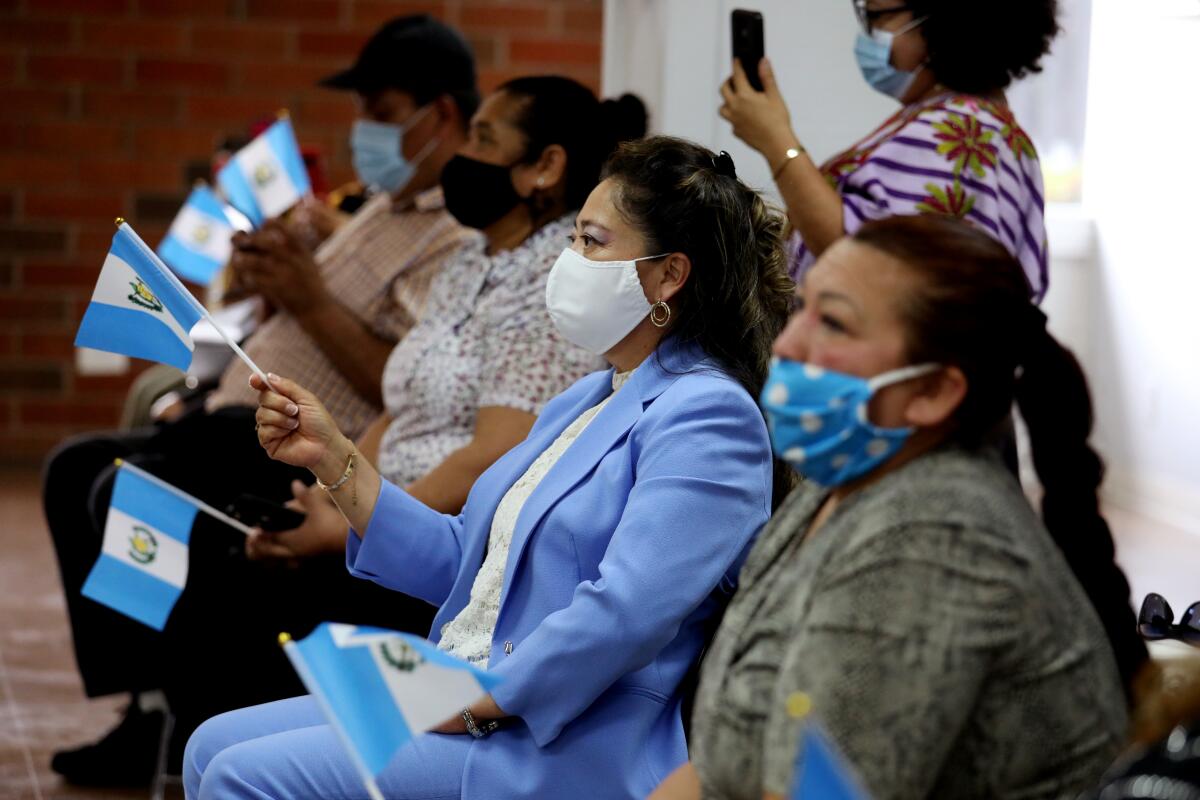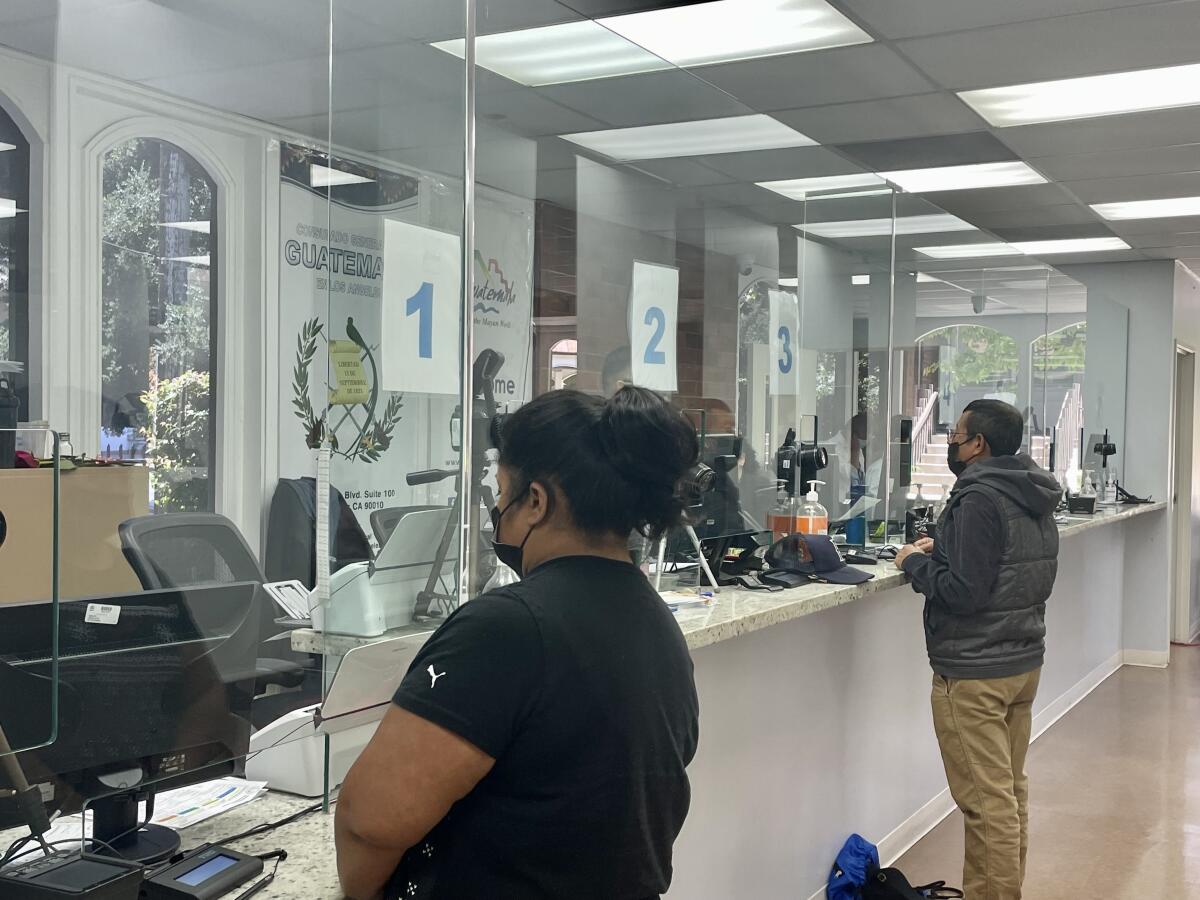‘Truthfully, it’s frustrating’: Guatemalans criticize delays at L.A. consulate

- Share via
The Guatemalan Consulate in Los Angeles uses its Facebook page to promote the Central American nation and trumpet its cultural achievements. But lately, many Guatemalans living in L.A. have used the page to plead, vent and despair over the lack of assistance they’re getting from their homeland.
“Please, I need help!” Esvin Larios wrote recently, detailing how he’d been trying for two weeks to make an appointment to obtain a passport via the consulate’s web portal. Although he’d quickly filled out the necessary online request form — “Seriously, it took me less than five minutes,” he said — all the slots were filled up, and he was forced to wait yet again.
Services at several of L.A.’s Latin American consulates were stymied and slowed by the pandemic. But since health restrictions eased and the economy opened back up, local outposts of the governments of Mexico, El Salvador and Honduras have largely resumed normal operations, while Guatemala’s has lagged.
The problems besetting the Guatemalan Consulate have been snowballing since March 2020, causing delays and other glitches for Guatemalan citizens trying to process and obtain passports, personal identification documents, consular identification cards and birth certificates. Now website issues are exacerbating the frustration.
“We want an appointment and we can’t enter the website,” said Moisés Arévalo, responding to a recent consulate Facebook post about “Guatemalan Day” celebrations Oct. 28.
The appointment system was implemented at Guatemalan consulates across the United States during the mandate of former President Jimmy Morales, a former actor-comedian who served from 2016 to 2020. Though glitches beset it from the outset, there had been a large call center operating in Guatemala that gave stateside residents another option to schedule appointments.
The appointment portal is enabled Fridays at 6 p.m. In less than 10 minutes, the available spaces are exhausted, and users must wait a week to try again. On a typical day, the consulate grants an average of 200 appointments.
The situation is worsened by difficulties in reaching a live consular staffer.
“We have been calling many times and only the machine answers,” said Josefina Arévalo, who arrived at the consulate to make an appointment for her husband, who needs personal identification documents to receive medical treatment. Arévalo left indignant because a security agent gave her only a piece of paper with the information from the appointment portal, and she did not have time to stay for additional help.
“We need them to do something to help people who can’t get on the internet,” Arévalo said.
Since mid-August, the consulate has been issuing passports within a day, but that hasn’t done enough to overcome a backlog of prior applications, now compounded by the new problem of scheduling dates. As of the start of October, the consulate in Los Angeles had a printing backlog of 6,082 passports — down from the 25,131 pending in July, but still formidable.
“They seek to solve some problems but superficially, it only serves to wash their faces,” said Giovanni Bautista, editor of the information portal La Voz del Inmigrante, which specializes in serving the Guatemalan community. “They appear to be solving the passport problem, but they are not paying attention to the case of appointments and the way they are granted.”
One October afternoon, Daniel Rivera left the consulate with a receipt in hand and the satisfaction of having processed his passport. The 22-year-old left his native Escuintla early this year. Nearly a month after settling in Long Beach, he began looking for an appointment at a local government office to obtain a passport and consular card — a step toward getting a California driver’s license. He started looking for a date in February and didn’t land an appointment until Oct. 21, for Oct. 26.
In the midst of the pandemic, Pedro Chip entered the portal to search for an appointment. After getting one in August, the 21-year-old arrived 15 minutes early for his 8:45 a.m. meeting.
Even so, “I was in line for about two hours,” said the Westlake resident and native of Santa Rosa province. “Then what is the appointment for?”
At 10:30 a.m. he finally was able to start filling out paperwork. But since he’d requested two documents, he had to wait three more hours. By the time he left the consulate, at 2 p.m., he’d had to phone in to explain why he wasn’t at work.

“Truthfully, it’s frustrating,” he said.
Each of the 25 consulates in the United States manages its own appointment system. Some observers link the problems of the Guatemalan consulates in the United States to the administration of Guatemala’s president, Alejandro Giammattei, who took power in January 2020, and his two foreign ministers, Pedro Brolo and Mario Búcaro.
“The consular service must be given a complete turnaround, but we do not have the competent authorities to do so,” said Úrsula Roldán, director of the Institute for Research in Socio-Humanistic Sciences of the Rafael Landívar University of Guatemala.
Roldán, an expert in international migration, said that the consulates must be able to provide agile, efficient and humane service to their compatriots as “a return to the sacrifice made by thousands of migrants sending remittances” back to reinforce Guatemala’s economy.
The scheduling problem is worrying for users who’ve asked for changes in the modality and for other simultaneous alternatives to be implemented, an issue that has reached the Congress of that nation.
“What worries me the most is the system of how appointments are managed,” said Andrea Villagrán, a Guatemalan congress member. “Foreign Minister Búcaro has already been made to see that we need a much more agile scheduling portal.”
Villagrán said there must be more ways for people to book appointments.
“There are different types of audiences and people. Not all of them use social networks, the internet and computers. There has to be a service that is provided on site, either in person or by phone,” she said.
José Arturo Rodríguez, consul general of Guatemala in Los Angeles, said the agency’s phone line, available at (213) 900-1098, has capacity for 5,000 calls; an email account, conslosangeles@minex.gob.gt, also handles appointment requests.
A new online appointment system will be implemented by January, Rodríguez said, adding that people who are older than 60 or pregnant do not need to make an advance booking. Neither do people in cases dealing with hospitalizations, immigration court appearances or relating to deceased family members.
“What we don’t want is to crowd people here at the door,” Rodríguez said. “We have to educate our people that we have to get in line with the times.”
But Aroldo Ramírez, general director of the community organization Misión Guatemala USA, said local authorities have little empathy with people in their community who lack formal education and technical savvy, and it’s not fair to implement a system that disadvantages these users.
“They should have more human sensitivity to understand our people,” he said.
More to Read
Sign up for Essential California
The most important California stories and recommendations in your inbox every morning.
You may occasionally receive promotional content from the Los Angeles Times.










